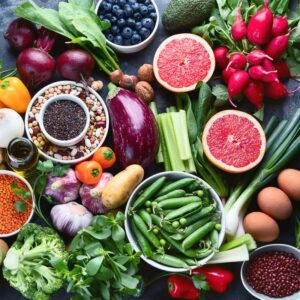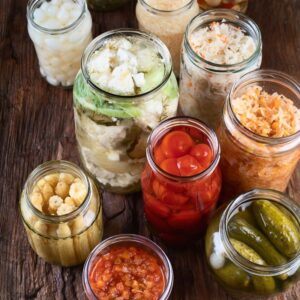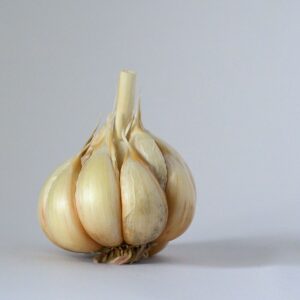Fun Tips to Boost Your Gut Health Game!
Let’s talk about everyone’s favorite topic: gut health! It might not sound glamorous, but, trust me, having a happy gut can be a game changer. From improving digestion to boosting your mood, a healthy gut is the ultimate sidekick in your quest for wellness. Here are 2 tips to improve gut health:
- Support a healthy microbiome
- Chew your food
Microbiome Health for Gut Health
When it comes to supporting a healthy microbiome, incorporating a variety of fiber-rich foods and fermented foods into your diet is key. Here are some of the best foods to nourish and promote a diverse and thriving gut microbiome:
Fiber-Rich Foods for Gut Health
• Fruits and Vegetables: Load up on a colorful array of fruits and vegetables, such as berries, apples, oranges, bananas, spinach, kale, broccoli, carrots, and bell peppers. These plant-based foods are abundant in soluble fiber, vitamins, minerals, and antioxidants that support gut health.
• Legumes: Incorporate legumes like beans, lentils, chickpeas, and peas into your meals. Legumes are excellent sources of soluble and insoluble fiber, as well as protein, which nourishes beneficial gut bacteria.
Fermented Foods for Gut Health
• Yogurt: Opt for plain, unsweetened yogurt containing live and active cultures, such as Lactobacillus acidophilus and Bifidobacterium bifidum (B. bifidum). Yogurt is a rich source of probiotics, beneficial bacteria that promote gut health.
• Kefir: Kefir is a fermented dairy product similar to yogurt but with a thinner consistency. It contains a diverse mix of probiotic strains and is often well-tolerated by those with lactose intolerance.
• Sauerkraut: Made from fermented cabbage, sauerkraut is packed with probiotics and provides a tangy flavor to dishes. Look for unpasteurized sauerkraut to ensure it contains live bacteria.
• Kimchi: A staple in Korean cuisine, kimchi is a spicy fermented vegetable dish typically made with cabbage and radishes. Like sauerkraut, kimchi is teeming with probiotics and adds a flavorful kick to meals.
• Miso: Miso is a traditional Japanese seasoning made from fermented soybeans, rice, or barley. It is commonly used to make miso soup and adds a savory umami flavor to dishes while delivering probiotic benefits.
 Prebiotic Foods for Gut Health
Prebiotic Foods for Gut Health
• Garlic: In addition to its culinary versatility, garlic contains prebiotic compounds that feed beneficial gut bacteria. Incorporate fresh garlic into your meals for a flavorful boost.
• Onions: Like garlic, onions are rich in prebiotic fibers that support the growth of beneficial gut microbes. Add raw or cooked onions to salads, stir-fries, and soups for added flavor and prebiotic benefits.
• Jerusalem Artichokes: Jerusalem artichokes, also known as sunchokes, are a rich source of inulin, a type of prebiotic fiber that nourishes beneficial gut bacteria. Enjoy them roasted, sautéed, or in soups for a tasty prebiotic boost.
By incorporating these fiber-rich foods, fermented foods, and prebiotic foods into your diet, you can provide your gut microbiome with the nutrients it needs to thrive, supporting digestive health and overall well-being. Remember to prioritize variety and enjoy a balanced diet for optimal gut health.
Chew Your Food
Chewing your food thoroughly might seem mundane, but is crucial in promoting gut health and overall digestion. Here’s how chewing benefits your gut:
Preparation for Digestion:
Chewing breaks down food into smaller particles, making it easier for digestive enzymes to access and break down nutrients. This initial mechanical breakdown of food in the mouth sets the stage for efficient digestion further down the digestive tract.
Increased Surface Area:
By thoroughly chewing your food, you increase its surface area, allowing digestive enzymes to work more effectively. This enhances the absorption of nutrients in the small intestine and ensures that your body can extract maximum nutrition from the foods you eat.

Stimulation of Saliva Production:
Chewing stimulates the production of saliva, which contains enzymes like amylase that begin the digestion of carbohydrates. Saliva also contains antibacterial compounds that help protect the mouth and throat from harmful pathogens, contributing to your overall oral health.
Promotion of Gut Motility:
Chewing triggers reflexes that stimulate peristalsis, the wave-like muscle contractions that propel food through the digestive tract. Proper chewing helps regulate the pace at which food moves through the digestive system, preventing issues like constipation or diarrhea.
Enhanced Nutrient Absorption:
Thoroughly chewing your food ensures that nutrients are released from the food matrix and are available for absorption in the intestines. This can help optimize nutrient uptake and support overall health and vitality.
Reduction of Digestive Discomfort:
Inadequate chewing can lead to larger food particles reaching the stomach and intestines, making them more difficult to digest. This can contribute to issues like bloating, gas, and indigestion. By taking the time to chew your food properly, you can help prevent these uncomfortable symptoms.
Chewing your food thoroughly is a simple yet powerful way to support gut health and optimize digestion. By breaking down food into smaller particles, stimulating saliva production, and promoting efficient nutrient absorption, proper chewing sets the stage for a healthy and well-functioning digestive system. So, the next time you sit down for a meal, remember to chew slowly and mindfully—it’s not just good table manners, it’s great for your gut too!
Diver deeper into the subject of gut health at the USDA.

Dr. William Davis, MD — An internal medicine physician, Dr. William Davis uses a comprehensive approach to deliver highly personalized, effective, and compassionate health care. Learn more about Dr. Davis.
Find out how PPMA can help you reach your health goals!



 Prebiotic Foods for Gut Health
Prebiotic Foods for Gut Health